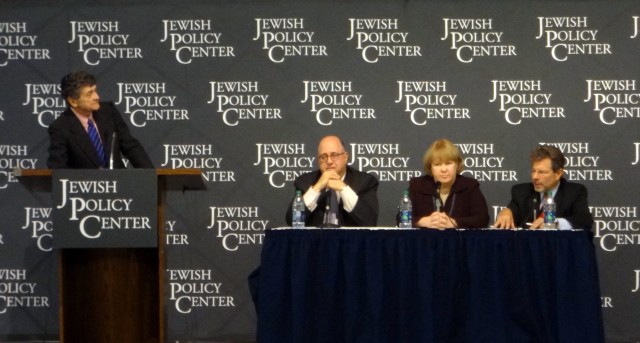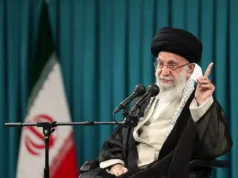Event Date: October 15, 2015 at 6:30 PM
Nearly 400 people turned out on a rainy night in Cleveland to attend the Jewish Policy Center’s October Forum. Best-selling author and radio host Michael Medved moderated the program as panelists John Podhoretz, Jennifer Dyer and Clifford May considered “What Next?” for Israel and the United States in the Middle East.
Noting that the American foreign policy establishment is wedded to a “two-state solution” between Israel and the Palestinians, May, President of the Foundation for the Defense of Democracies, called the idea “not currently viable…Abbas has no power in Gaza and little power in the West Bank. If he signed a deal (with Israel) no one would agree to participate. In addition, President Obama has empowered Iran – which believes in the destruction of Israel. Abbas can’t go against Iran. What would he say? ‘I don’t care what Iran wants, I’m making a deal with Israel.’?”
Dyer, a retired U.S. Navy Commander and intelligence specialist, said, “Oslo is dead. The mental construct has to change and the U.S. has to become credible behind Israel. Abbas is not a credible partner and throwing him out is not credible. The U.S. has to agree on goals with Israel, and then go forward.”
“What we need,” Medved said, “is someone who will build a strong, united America. Nothing damages Israel more than the idea that we are in decline.
“The future is not written,” added May. “Decline is a choice; failure is not inevitable. That said, the trends are not good.”
Podhoretz, editor of Commentary Magazine, responded to a question about Russia’s Middle East ambitions. “The rise of Putin is a consequence of the U.S. absence,” he said. “Russia should be a second-rate, tin pot country. It is in terrible condition. But we invited Russia into Syria so President Obama could avoid his own red line on chemical weapons. We ceded Russia that role.”
Dyer said the future of the Middle East, and the world, depends largely on what happens in the United States. “We are the one country with universalist principles. We are the one country that makes it policy to advance the principles of democracy, rule of law, and tolerance for others. There is now a feeding frenzy in the Middle East – Iran, China, and Russia are all looking for clients in a part of the world the U.S. used to claim as its primary area of interest.”
In closing the program, Podhoretz said, “A lot of the bad news is the result of American withdrawal from the field and some of it might be righted if the U.S. participates. Russia and China don’t really want to challenge us – we may rise to the challenge and they may not. They’re taking what they can get while we’re not playing.
“But if you had a choice of where to be born, of the 192 countries in the world, you would choose the United States. The U.S. is MORE the place to want to be born now than it was in the 1970s.”







